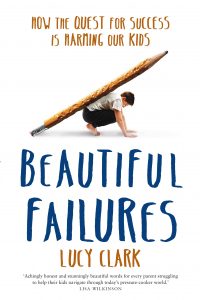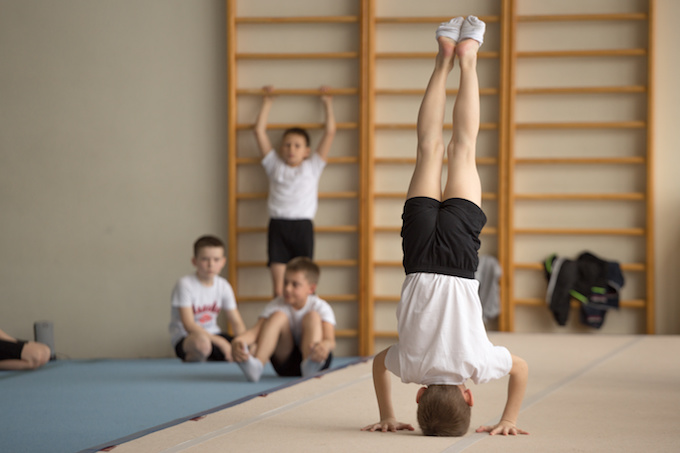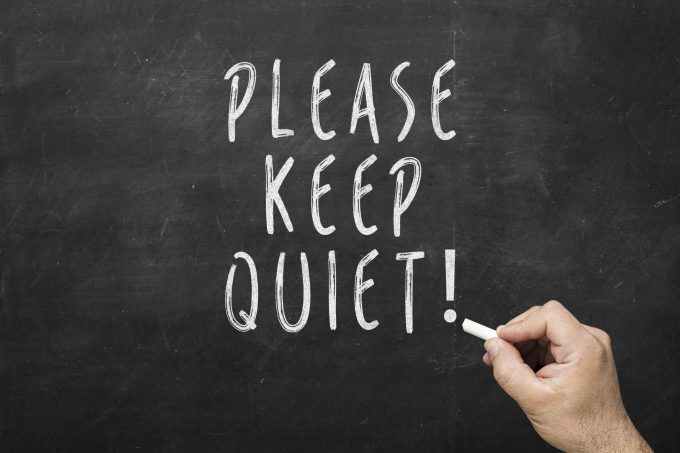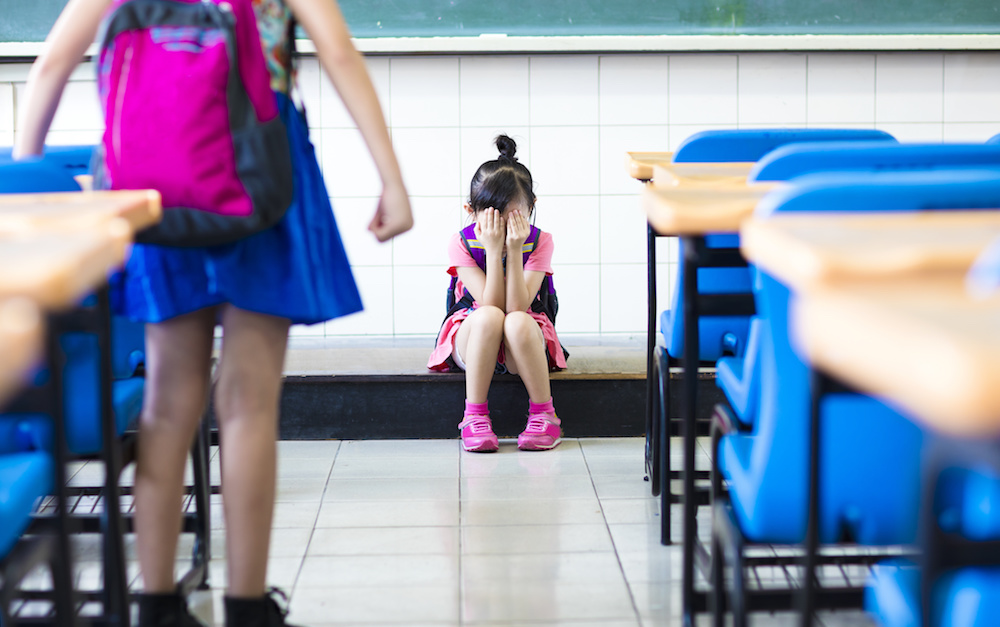
Lucy Clark is the author of Beautiful Failures, which begins with “I want to tell you a story about my daughter, my beautiful failure.” Lucy spoke with Suzy Barry about pressure, parent-teacher relations and the pitfalls of “the quest for success”.

You set out to track down the sources of pressure on kids, after your daughter spent her school years struggling with pressure and feeling like a failure, what did you find?
This was so interesting because everyone talks about the pressure, and how terrible it is, but so many parents say they don’t know where it comes from and that they don’t pressure their kids. At the same time there is all this discussion about how we can help kids cope with the pressure and the importance of success.
Just recently there was a story that said mental health organisations were providing extra counselling during exam time … to help parents cope with the pressure of their kids’ exams! It feels utterly wild – everyone is talking about how to cope with the terrible pressure, but to me it’s the wrong question. We should be asking about how to systematically reduce the pressure in our kids’ lives. It’s too much.
To do this, we have to understand the sources of pressure. I did really set out to track these down, and I found that the pressure works on a number of different levels.
It starts in the home and it starts early, because we’ve all received the societal messages that tell us that academic outcomes are so important and the way to get ahead. We believe that we should try to get our kids into gifted and talented programs from the moment they start school. We believe they have to get the edge over all the other kids, because all the messaging is around education being a kind of race.
We don’t really question the role of this competition in education, although we should. So I looked into competition in education – the research here was so fascinating, and goes right to the heart of the human condition. It’s confronting! Then there is the pressure on teachers and principals to collect data and ensure the kids are getting good outcomes.
Then there is the overarching global pressure that comes from the PISA program of testing that ranks countries, and politicians start talking about how we must do better in the international rankings, and the pressure on everyone gets turned up a notch. I went to Paris to interview Andreas Schleicher, who runs the PISA testing, and it was a fascinating discussion. We talked about bureaucratic, prescriptive systems (like Australia) and how it was hard on both teachers and the end users – the kids. He’s big on trusting teachers, valuing teachers, and letting them get on with their job. The best performing systems do that.
What sorts of approaches have you see from teachers and school leaders that best support students who are feeling the pressure?
The best schools I saw genuinely put kids at the centre, and instituted systems that supported that ethos, rather than just saying it. This automatically lessens pressure because academic outcomes take a backseat to valuing the whole child, and come second to engagement with ideas and learning. Some of the pressure on kids comes from them feeling like they don’t matter (the research on this is very interesting), like they don’t have a say in anything.
I saw principals making fantastic progress through actively involving students in their learning, even handing over complete control over their learning program. It means a relinquishing of the old command and control model, but giving a child a sense of agency will increase their engagement in the learning… and lead to better outcomes naturally. Most importantly, the teachers and school leaders who understand that the non-cognitive supports the cognitive are the ones best supporting students and their wellbeing. The mental health of our adolescents seems to be at some kind of crisis point, so a lot of my book looks into that and where these issues intersect with schooling, and what schools are doing about it.
 What did you learn about the best way parents and teachers can communicate with each other about children’s education?
What did you learn about the best way parents and teachers can communicate with each other about children’s education?
Just about every educator I spoke to said the words “everyone thinks they know how to run a school because they’ve been in one”. It was mostly said in a tired tone! And I understand how tiresome it must be dealing with parents who think they know how to run schools, but don’t. Of course parents don’t know how to run schools, but we know when something is going wrong with our kids and we’re entitled to ask questions when that happens.
Of course there are ways to do this, and respect must be the starting point. Parents need to understand that teachers are the experts in pedagogy and curriculum, but teachers need to understand that the parent is the experts in their individual child, and therefore has much valuable information about that child to share.
The problem is that the system doesn’t care much for individuals. Teachers are strapped for time and resources, which makes it harder and harder to care about individuals and their needs. So the kids have to fit the cookie mould, and a lot of them just can’t. These kids are generally punished one way or another, which is terrible. They are made to feel wrong, or like failures, and this can start from a very young age.
I think it would be a good start to shift the conversation away from grades and outcomes, away from letters and numbers, to talk about the way individual kids learn and engage, about their strengths. Not just about whether they are going to get an A or B or a D. It seems like a little thing, but if we only ever talk about the grades then parents – and kids – are going to go on thinking that’s the only thing that matters. I interviewed a lot of terrific teachers and school leaders who have great ideas about this.
What sort of feedback have you received since the publication from your book?
I’ve been overwhelmed by the number of people expressing relief actually! It’s been so interesting talking to both parents and teachers about all of this. Parents are relieved because they sense that things are kind of wild, but they haven’t been able to put their finger on how it happens. And teachers have expressed gratitude that my message to parents is to back off on the pressure and that I’m trying to start a vital conversation about a system that doesn’t seem to be working for anyone.
Mostly I sense a great hunger for reform from so many working in the system, and I interviewed some really amazing people who have outlined that reform, and others who are living it. It’s exciting.
What is the main message you would like all stakeholders in education – parents, principals, teachers, and politicians alike – to take away from your book?
Firstly, that the wellbeing of children is more important than academic outcomes, and that the former shouldn’t be sacrificed to achieve the latter (some of the stories in my book broke my heart). We need to broaden our ideas of success and value all kids.
We need to challenge all the accepted wisdoms about school and education that we take on board without blinking an eye; all those things we perpetuate just because that’s the way things have always been done, and because they’re the rules. I challenge everyone to question the rules, question authority, including their own, especially their own. Genuinely ask: is this really the best way to achieve what we want?
But then the question becomes what do we want, doesn’t it?
We want kids who love learning and want to do it for the rest of their lives. We want creative thinkers, original thinkers, not box-tickers or rote learners. As we head into an uncertain future, we know we are going to need great thinkers to solve unforeseen problems; there is nothing more important that the education of new generations of kids, the fostering of our future great thinkers.
What about when not everybody wants the same thing? Or is there validity in designing systems for what everybody ‘needs’ instead?
This is the beauty of pedagogical concepts like student-led learning, or dispensing with year levels and letting kids progress at their own pace, which are more disposed to dealing with individual wants and needs. These ideas work for all types of kids. There are examples in my book where schools are operating to these concepts with great success, so we know it can work if there is the will for reform, for shaking things up. And a happy by-product is that the mental wellbeing of kids is promoted. Principals reported to me that maladaptive behaviour in kids is all but eradicated very quickly.
So what next?
We need to have a community-wide discussion about what education should be and what school is for, both philosophically and practically speaking. Because right now, not only is the system making kids suffer, it barely seems fit for purpose.







